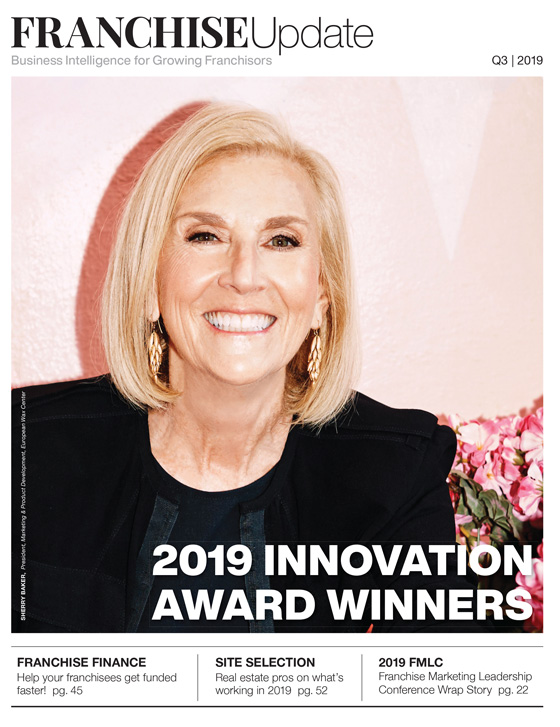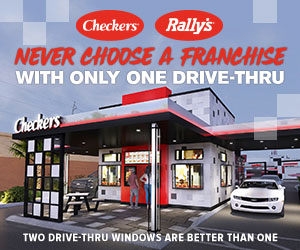Artful Advocate: Young Rembrandts Preps for Global Expansion

Bette Fetter was sitting at a kitchen table in 1988, teaching her children and their friends how to draw when a light bulb came on. Before long she had applied her fine arts education and background in childhood development with her blossoming passion to teach drawing, and created Young Rembrandts. The concept offers original methods of teaching kids how to draw through a weekly step-by-step process that exposes students to a wide variety of subject matter, artistic concepts, art history, and materials.
Fetter began franchising her concept in 2001 in schools, community centers, and park districts across the country. Today, Young Rembrandts teaches 40,000 students between the ages of 3½ and 12 each week across 31 states and four Canadian provinces, giving children everywhere a creative outlet for their developing minds.
As founder and CEO, Fetter says she's responsible for setting the tone of how the brand operates and grows, as well as its culture. "A CEO establishes the culture and continues to convey that with franchisees, staff, and customers," she says.
From there, she says, her job is to tell the world why art matters so much. "So much so that they go looking for my franchisees, and potentially investigate becoming franchisees themselves. We're on this journey together to improve education, boost kids' confidence and learning skills, and help children blossom."
Fetter recognizes that she needs a staff who can develop the tools and support franchisees need to be successful and who share her values. "Integrity, community, communication, respect. These are the values I cherish on a personal level, and they're what I value on a professional level as well," she says.
Young Rembrandts continues to roll along under Fetter's leadership. "We are going to be opening between four and five international programs and will have a steady number of franchisees opening in the United States and Canada," she says of the near future. "We also have some additional programs we're working on and rolling out."
Of course, the fundamental goal always remains that more and more kids will be exposed to art and become passionate about drawing because of their involvement in Young Rembrandts.
Name: Bette Fetter
Title: CEO, Founder
Company: Young Rembrandts
Units: 93
Age: 65
Years in franchising: 18
Years in current position: 31
Leadership
What is your role as CEO?
To create the vision and road map for the direction of the company. I have built a very strong team of leaders who will put that vision into action and execute. I'm also responsible for setting the tone of how we operate, in terms of ethics, values, and our culture. A CEO establishes the culture and continues to convey that with franchisees, staff, and customers on a local level. On the franchise level, I work to demonstrate the vision of the organization and to represent the public face of the brand so the franchisees know they are part of something truly special. My job is to tell the world why art matters so much so that they go looking for my franchisees and potentially investigate becoming franchisees themselves. I want more people to be involved in my mission. We're on this journey together to improve education, boost kids' confidence and learning skills, and help children blossom. I take it very personally to recruit people into this journey, whether they are parents looking to help their child or an entrepreneur looking for a business.
Describe your leadership style.
I'm very hands-on when someone is first starting in a position because I want to make sure they really, truly understand the mission and values and the way we communicate. Once I'm confident that they really get it, then I give them a lot of rope. At that point I'm still checking on them, but also giving them the space to really settle into their role and be more independent.
What has inspired your leadership style?
Above all, my personal ethics and values drive my leadership style in the office day to day. Integrity, community, communication, respect--these are the values I cherish on a personal level, and they're what I value on a professional level as well. People who know me personally have said the way I am in private carries over into business; that I show the same communication, respect, and ethics, which is important to me.
What is your biggest leadership challenge?
Learning how best to adapt the support and resources to meet each individual franchisee's needs. In a franchise system, there are a lot of personalities, abilities, and backgrounds. There are times when you need to flex and look at what can be adapted, but there also are times you need to hold true to what you know works and is best for the business. As CEO, my role is to put a staff in place to develop the tools and support franchisees need to be successful. That's my job: to make sure the right people are there to provide the right tools so the franchisees have what they need.
How do you transmit your culture from your office to front-line employees?
First, I hire people who have a similar sense of culture and ethics. And then, in working closely with each other, we develop a sense of how we communicate with franchisees. For me, that means hiring people who have a similar passion for the arts, for education, and for working together. I find that people who want to build up and educate kids are also the same people who want to build up and educate franchisees. It's not just a job. I look for people who have that kind of understanding. We pride ourselves on being mission-centered and passionate as an organization. My employees have the same passion and can be just as emotional when they hear a great story from the classroom as I am. Our culture is entrepreneurial, socially aware, and passionate about art education. We have a good library of digital training tools for our franchisees to use when training their staff. I take it very seriously, personally review every piece, and often participate in a lot of the videos. I want our front-line staff to know I care and that I have been there.
Where is the best place to prepare for leadership:
an MBA school or OTJ? Frankly, my management degree didn't do anything for me in terms of leadership. It's on-the-job learning that can be the most important part, but you must also look for other resources. I've worked with different consultants and coaches over the years and went to classes and workshops more focused on personal development. For me, leadership has meant growing as a person to overcome fears and limitations because personal growth leads to professional growth, and that happens over many years both inside and outside of a classroom.
Are tough decisions best taken by one person? How do you make tough decisions?
Ultimately, as the CEO you are the one who has to make the tough decisions. For me, I look for input from my key staff and always consider their experience and their feedback on the situation. But in the end I have to make the call.
Do you want to be liked or respected?
Respected.
Advice to CEO wannabes:
I never really wanted to be a CEO myself. I think there are certain personalities that do well as a CEO--people who tend to be more administrative and leadership-oriented, which I am. If you want to be a CEO, you need to roll up your sleeves and get in there and work with people. You don't just sit in your office and make decisions, you need to know how the business works from the ground up. To be an effective CEO, you need to know the people, the jobs, the challenges, and you need to live it. Then you're able to bring your own insights to the job and build a culture around that. There needs to be a strong element of emotional intelligence in your approach to business, and in the people you bring into your company to serve under you.
Management
Describe your management style:
Leadership is about casting the vision, and then selling the vision. Management is more about guiding someone closely until you know they really get the product and know what they're doing. Effective management is about the balance between knowing when someone needs more oversight and when they need to be given freer reign. Often that comes down to understanding where someone is as an employee, based on their experience.
What do you think makes up a good management team?
Emotional intelligence; people who work well together but who also are able to really see and work toward the needs of the group while giving attention to individuals.
How does your management team help you lead?
My management team is very communicative with our franchisees. As a result of our high level of communication and interactions with franchisees, we have very high franchisee satisfaction. Our franchisees know they're heard. My leadership team is extremely involved with franchisees and are advocates for the brand. One of our core values is "communication with understanding." So it's not just that they shoot out an email. My team does all they can to be sure franchisees understand what's going on, that they have the tools and support they need. They balance the company's goals and mission well with the needs of the franchisees. In addition to being very communicative with the franchisees, my management team is very communicative with me and with each other through regularly scheduled meetings.
Favorite management gurus: Do you read management books?
None at the moment, but I did used to follow the Michael Hyatt group. I used to read more professional books, but the further I get in my career as CEO the more I depend on my own lived experience and expertise as a manager and that of my team, rather than any "gurus." Now I read more personal development books than management or leadership books. I feel personal development helps me grow my management style more than anything else. I also find a lot of helpful information in faith-based books such as the The Culture of Honor.
What makes you say, "Yes, now that's why I do what I do!"?
For me, it's stories from the classroom. When I hear or read a parent testimonial, or I hear about what a teacher shared about a classroom, or a franchisee talks about their teachers or students, I think, "Yes, that's why we do this."
Personal
What time do you like to be at your desk?
By about 9 a.m. I spend about two hours before that reading, being prayerful and reflective, maybe even spending some time at the drawing board.
Exercise in the morning?
Wine with lunch? I take walks and exercise in the afternoon. I eat lunch at my desk, so generally no wine.
Do you socialize with your team after work/outside the office?
Sometimes. I'm lucky enough to work with two of my adult children, so I definitely socialize with my son and daughter and their families outside of work. We socialize a lot at the office, celebrating birthdays, bringing in treats and baked goods. There are always fun activities like chili or taco cook-offs and other ways to make work fun and let us connect on a personal level at work.
Last two books read:
Big Magic by Elizabeth Gilbert and The Aviator's Wife by Melanie Benjamin.
What technology do you take on the road?
iPad and iPhone.
How do you relax/balance life and work?
Art, yoga, prayer, meditation, and a strong and grounding relationship with my family.
Favorite vacation destinations:
Somewhere with a beach.
Favorite occasions to send employees notes:
I do holiday and year-end notes, but I also like to find random times to send notes and tell them they're great.
Bottom Line
What are your long-term goals for the company?
We're going to be a global franchise, with a presence in all major international markets. In North America, I want us to expand into all 50 states and Canadian provinces. Right now, we're teaching 40,000 kids a week, but I want to reach 500,000 kids a week, or even a million. The more kids we can reach, the better. Our mission statement is to raise generations who value art. I want to change people's mindsets about the arts, drawing, and creativity. I want to help make it an integral part of children's lives every day. And with Young Rembrandts expanding, kids everywhere will have access and can be participating.
How has the economy changed your goals for your company?
I don't know that it has in the long term. During the recession, we didn't experience a very significant drop in sales. We saw that people were more willing to skip eating out and cut back in other areas rather than drop their kid's enrichment opportunities. And now, with a strong, healthy economy, it just means more people can sign their kids up for more enrichment activities.
Are there any trends in the industry you foresee having an impact on your brand?
The children's enrichment industry has grown tremendously. It hardly existed when we started. The growth of children's enrichment opportunities is good because people come looking for you now, but it is more competitive for children's time. And overall, the increased offerings and "competition" are great for kids and their educational opportunities. As far as franchising, there's been more of a move toward flexible schedules, working from home, and being more in control of your life and circumstances in corporate life. And that trend is great for us, because our franchise model lends itself to that work-life balance. A lot of people want that now, and that's how Young Rembrandts has always been.
How do you measure success?
I measure success with my heart and with numbers. You must have both. First, I consider our mission. Are the kids and teachers doing well? Are my franchisees happy and enjoying their work? Are they prospering and feeling effective? Then as a business, I look at numbers to confirm that success is reflected in our growth and profitability.
What has been your greatest success?
The longevity and strength of Young Rembrandts. After 30-plus years, it feels like we're just getting started. I feel like we're on the cusp of accomplishing so much more. Also, two of my adult children have careers with Young Rembrandts. That's so exciting to me. They are both remarkable and it means Young Rembrandts gets to stay a family business and live on in this next generation.
Any regrets?
Regrets are always part of the growing process, but I like to deal with regrets as they happen. Forgive and move on. It's so much better to focus on the good.
What can we expect from your company in the next 12 to 18 months?
We are going to be opening between four and five international programs and will have a steady number of franchisees opening in the United States and Canada. We also have some additional programs we're working on and rolling out. Finally, as always, more and more kids will be exposed to art and become passionate about drawing through our program.
Share this Feature
Recommended Reading:
FRANCHISE TOPICS
- Multi-Unit Franchising
- Get Started in Franchising
- Franchise Growth
- Franchise Operations
- Open New Units
- Franchise Leadership
- Franchise Marketing
- Technology
- Franchise Law
- Franchise Awards
- Franchise Rankings
- Franchise Trends
- Franchise Development
- Featured Franchise Stories
FEATURED IN

Franchise Update Magazine: Issue 3, 2019








 The franchise listed above are not related to or endorsed by Franchise Update or Franchise Update Media Group. We are not engaged in, supporting, or endorsing any specific franchise, business opportunity, company or individual. No statement in this site is to be construed as a recommendation. We encourage prospective franchise buyers to perform extensive due diligence when considering a franchise opportunity.
The franchise listed above are not related to or endorsed by Franchise Update or Franchise Update Media Group. We are not engaged in, supporting, or endorsing any specific franchise, business opportunity, company or individual. No statement in this site is to be construed as a recommendation. We encourage prospective franchise buyers to perform extensive due diligence when considering a franchise opportunity.